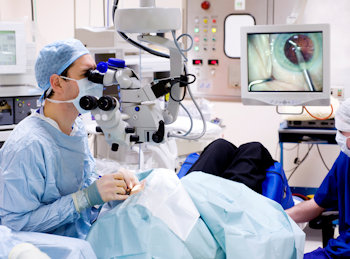Medicare and Cataract Surgery
Many people who have cataracts are covered by Medicare. If you decide to have surgery, it’s important to understand whether Medicare will pay for it and what Medicare covers and does not cover.

Our refractive surgeon, Yasaira Rodriguez, MD, are both board certified by the American Board of Ophthalmology and specialize in the medical and surgical treatment of the eye, including cataract surgery, eyelid surgery and glaucoma surgery.
Does Medicare Cover Cataract Surgery?
The main cost components of basic or traditional cataract surgery are the pre-surgery exam to discuss your cataracts, the surgeon’s fee, the anesthesia fee, the surgery center’s fee, the cost of a standard intraocular lens (IOL), and the cost of one pair of eyeglasses or contact lenses after surgery, if you need them.
Although Medicare does not cover routine vision care, medically necessary surgical procedures, such as cataract surgery, are covered.
If you have cataract surgery as an outpatient, Medicare Part B will cover your treatment, and you may be responsible for deductibles and copayments. If you are admitted to the hospital for the procedure, you will be covered under Medicare Part A, and your coverage and costs will be different. Talk to your doctor at Elmquist Eye Group beforehand so you will know what to expect.
After your cataract surgery, Medicare Part B may pay for one pair of glasses or contact lenses if you get them through a Medicare-enrolled supplier. You may have a copayment for the glasses or contact lenses, and the Part B deductible applies. You will also be responsible for paying for the cost for upgraded frames.
Depending on your pre-surgery examination and the visual results you hope to achieve from cataract surgery, we may recommend a customized treatment plan that could reduce your need for glasses or contact lenses after surgery.
In other words, Dr. Rodriguez may recommend that you consider an advanced-technology replacement lens, or premium IOL lens, to correct presbyopia or astigmatism and allow you to see clearly at all distances.
These advanced lenses, as well as advanced refractive testing, topography screenings, pupil screening, OCT screenings and other screening tests you may need before surgery in order to achieve the best results, are generally not covered by Medicare (or most private insurance plans).
If you decide on an advanced technology upgrade, such as bladeless laser-assisted cataract surgery, or a Toric or multifocal lens, you will be responsible for the additional cost.
Get in touch with Elmquist Eye Group at (239) 936-2020 to schedule an appointment. We would be delighted to answer all of your questions about Medicare and cataract surgery and about how we can help restore your good vision.
